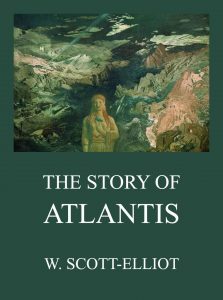The Story Of Atlantis – W. Scott-Elliot
There is not much in mythology that has drawn so much interest than the lost continent of Atlantis. In this book the author, W. Scott-Elliot, tries to provide a geographical, historical and ethnological sketch of all that was and might have been. He even includes essays on the Lemurian race, their language and life. This is a treasure chest for any person interested in Atlantis

The Story Of Atlantis
Format: Paperback.
The Story Of Atlantis.
ISBN: 9783849677480.
Available at amazon.com and other venues.
What is Atlantis?(from wikipedia.com)
Atlantis is a fictional island mentioned within an allegory on the hubris of nations in Plato’s works Timaeus and Critias, where it represents the antagonist naval power that besieges “Ancient Athens”, the pseudo-historic embodiment of Plato’s ideal state (see The Republic). In the story, Athens repels the Atlantean attack unlike any other nation of the (western) known world, supposedly giving testament to the superiority of Plato’s concept of a state. At the end of the story, Atlantis eventually falls out of favor with the gods and submerges into the Atlantic Ocean.
Despite its minor importance in Plato’s work, the Atlantis story has had a considerable impact on literature. The allegorical aspect of Atlantis was taken up in utopian works of several Renaissance writers, such as Francis Bacon’s New Atlantis and Thomas More’s Utopia. On the other hand, 19th-century amateur scholars misinterpreted Plato’s narrative as historical tradition, most notably in Ignatius L. Donnelly’s Atlantis: The Antediluvian World. Plato’s vague indications of the time of the events—more than 9,000 years before his time—and the alleged location of Atlantis—”beyond the Pillars of Hercules”—has led to much pseudoscientific speculation. As a consequence, Atlantis has become a byword for any and all supposed advanced prehistoric lost civilizations and continues to inspire contemporary fiction, from comic books to films.
While present-day philologists and classicists accept the story’s fictional character, there is still debate on what served as its inspiration. The fact that Plato borrowed some of his other allegories and metaphors—most notably the story of Gyges—from older traditions has caused a number of scholars to investigate possible inspiration of Atlantis from Egyptian records of the Thera eruption, the Sea Peoples invasion, or the Trojan War. Others have rejected this chain of tradition as implausible and insist that Plato designed the story from scratch, drawing loose inspiration from contemporary events like the failed Athenian invasion of Sicily in 415–413 BC or destruction of Helike in 373 BC.
Publisher’s Note: This book is printed and distributed by Createspace a DBA of On-Demand Publishing LLC and is typically not available anywhere else than in stores owned and operated by Amazon or Createspace.
